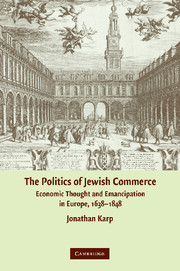Book contents
- Frontmatter
- Contents
- Acknowledgments
- Introduction
- 1 This Newfangled Age
- 2 From Ancient Constitution to Mosaic Republic
- 3 A New System of Civil and Commercial Government
- 4 The Natural Relation of Things
- 5 A State within a State
- 6 The Israelites and the Aristocracy
- 7 Jews, Commerce, and History
- 8 Capitalism and the Jews
- Afterword: Industrialization and Beyond
- Notes
- Bibliography
- Index
3 - A New System of Civil and Commercial Government
Published online by Cambridge University Press: 18 July 2009
- Frontmatter
- Contents
- Acknowledgments
- Introduction
- 1 This Newfangled Age
- 2 From Ancient Constitution to Mosaic Republic
- 3 A New System of Civil and Commercial Government
- 4 The Natural Relation of Things
- 5 A State within a State
- 6 The Israelites and the Aristocracy
- 7 Jews, Commerce, and History
- 8 Capitalism and the Jews
- Afterword: Industrialization and Beyond
- Notes
- Bibliography
- Index
Summary
When in 1753 Parliament passed a law making possible the naturalization of foreign Jews, it was in a form far narrower than the one Toland had envisioned in 1714. It also sparked a national debate whose anti-Jewish vehemence might have surprised him, and whose result – the bill's repeal in late 1753 – would certainly have disappointed him. The Jewish Naturalization Bill sought to eliminate the Alien duties (excise taxes) imposed on that small number of foreign-born Jewish merchants who possessed sufficient wealth to practice large-scale international trade. That it would do so by circumventing the Protestant oath normally required for naturalization frightened many Englishmen into believing the claims of propagandists that the bill constituted a mortal threat to the country's Christian character. This fear was greatly exacerbated by rumors that the bill aimed to naturalize all foreign Jews presently residing in England (about one-half the Jewish population there) as well as to invite much larger numbers of Jewish immigrants into the country. In truth, the bill stipulated that individuals seeking naturalization would be required to obtain a special act of parliament in their behalf, a procedure whose expense would have been prohibitive to all but a few. Moreover, eligibility was confined to those who had established residency in the country for a minimum of three years and demonstrated a proven utility.
- Type
- Chapter
- Information
- The Politics of Jewish CommerceEconomic Thought and Emancipation in Europe, 1638–1848, pp. 67 - 93Publisher: Cambridge University PressPrint publication year: 2008



